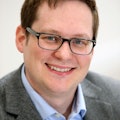We seek to foster interactions and stimulate new cross-disciplinary research into innovative and potentially disruptive technological capabilities in biosensing and advanced imaging that will drive world-leading discoveries in the health and life sciences.
As a network our mission is:
- to facilitate collaboration between researchers across the University through sharing of equipment and expertise
- to create a platform that will enable the dissemination of our research to academics, industry and stakeholders
- to promote Cardiff University expertise in biosensing and bioimaging around the world.
Aims
Our specific scientific aims are:
- To develop novel sensing modalities that employ advances in material science and nanotechnology to achieve unprecedented functionalities. To develop novel imaging and analytical capabilities which could enable early detection and predictive diagnosis of diseases.
- To develop novel contrast reagents and chemical probes, improving delivery technologies, to enhance imaging and sensing capabilities.
Research
We conduct research on:
- Next-generation optical microscopy instrumentation development.
- Diagnostic devices with miniaturised light sources and detectors.
- Chemically sensitive label-free bioimaging of living cells and tissues.
- Software development for quantitative image analysis.
- Coherent optical “nanoscopy” of single molecules/particles.
- Development of new biochemical probes, including engineering of fluorescent proteins.
- Nanoparticles and functionalised nanostructures for drug delivery.
- Delivery of small molecule drugs and biopharmaceuticals.
- Characterizing endocytic pathways for drug delivery research.
- Production and purification of diamond nanoparticles with single photon centres.
Projects
Examples of projects with the BioSensing and Imaging Network include:
- EU Marie-Curie ETN Multi-partner Award “Multiphoton Microscopy and Ultrafast Spectroscopy: Imaging meets Quantum (MUSIQ)” (Paola Borri, Wolfgang Langbein,Pete Watson)
- BBSRC Research Grant Award BB/R021899/1 “A label-free tool to unravel the dynamics of lipid bilayers containing single membrane proteins: iGOR microscopy” (Paola Borri, Wolfgang Langbein, Mark Young)
- BBSRC Research Grant Award BB/P007511/1“Lipid droplets in oocytes: shedding new light on why fats are good or bad for development” (Karl Swann, Paola Borri, Wolfgang Langbein, Rosalind John)
- SerCymru II Rising Star Fellowship “Integrated compound semiconductor lab-on-chip optical biosensor enabling infectious disease diagnostics at the point-of-care” (Francesco Masia)
- CRUK/EPSRC project C368/A22099 NS/A000040/1 “Using CARS microscopy to realise the potential of 3D culture for personalised medicine and drug delivery” (Trevor Dale, Paola Borri, Wolfgang Langbein)
- EPSRC Research Grant Award EP/R009147/1 “Two-photon Lithography for Isotropic 3D Nanostructure Fabrication” (Sam Ladak, Wolfgang Langbein, Paola Borri)
- EPSRC DTP PhD Studentship “Integrated compound semiconductor lab-on-chip optical biosensor” (Francesco Masia, Wolfgang Langbein, Paola Borri)
- BBSRC Research Grant award BB/P009980/1 “Traceless, non-invasive and spatiotemporal control of protein activity in cells.” (Louis Luk, Yuhsuan Tsai, Arwyn T. Jones and Ruedi Allemann)
- ERDF, Welsh Government Ireland-Wales INTERREG Operation. Celtic Advanced Life Science Innovation Network. CU Investigators Arwyn T Jones, Mark Gumbleton, James Birchall, Jenna Bowen, Peter. Watson.
Meet the team
Lead researcher
Academic staff

Dr Florian Siebzehnrubl
Senior Lecturer, Deputy Director European Cancer Stem Cell Research Institute

Professor Arwyn Jones
Professor of Membrane Traffic and Drug Delivery, and Director of Research & Engagement

Professor Peter Watson
Director for Postgraduate Education, Professor, Academic lead of imaging facilities, Postgraduate Research Teaching Co-ordinator
Postgraduate students
Associated staff
Next steps
Research that matters
Our research makes a difference to people’s lives as we work across disciplines to tackle major challenges facing society, the economy and our environment.
Postgraduate research
Our research degrees give the opportunity to investigate a specific topic in depth among field-leading researchers.
Our research impact
Our research case studies highlight some of the areas where we deliver positive research impact.














